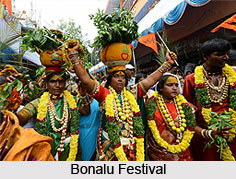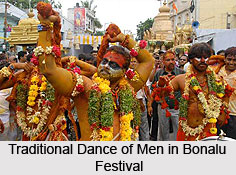 Bonalu Festival is celebrated in the month of Ashada masam or in July to August in some regions of Andhra Pradesh and Telangana.
Bonalu Festival is celebrated in the month of Ashada masam or in July to August in some regions of Andhra Pradesh and Telangana.
Special worships are performed for Yellamma on the first and last day of the festival. Bonalu is also considered as a thanksgiving to the Goddess for fulfilment of promises.
Derivation of Bonalu Festival
"Bonam" word means Bojanaalu or a meal in Telugu language which is an offering to the Goddess. Women bring cooked rice with milk, sugar in a brass pot, adorned with small neem branches, turmeric, vermilion or white chalk and a lamp on the top. Women place the pots on their heads and take it to the temple, led by drummers and dancing men.
Rituals of Bonalu Festival
Bonalu festival starts at Golconda Mahankali which is located inside the Golconda fort, and follows with Secunderabad`s Ujjaini Mahakali Temple, Balkampet Yellamma temple and then to the old city. Women wear silk sarees on that day. Some women dance with balancing pots to the rhythmic beats of drums.
Significance of Bonalu Festival
 In order to ward off evil spirits, in olden days, people used to sacrifice a male buffalo in front of the temple. Now however roosters are sacrificed at times. It is believed that the women carrying the Bonalu possess the spirit of Mother Goddess, and when they go towards the temple, people pour water on their feet to pacify the spirit. Devotees offer a Thottela which is a small colourful, paper structure supported by sticks, as reverence. It is believed that the Goddess during Ashada Maasam comes back to her maternal home.
In order to ward off evil spirits, in olden days, people used to sacrifice a male buffalo in front of the temple. Now however roosters are sacrificed at times. It is believed that the women carrying the Bonalu possess the spirit of Mother Goddess, and when they go towards the temple, people pour water on their feet to pacify the spirit. Devotees offer a Thottela which is a small colourful, paper structure supported by sticks, as reverence. It is believed that the Goddess during Ashada Maasam comes back to her maternal home.
Potharaju is the brother of Mother Goddess that is represented in the procession by a well-built wearing a small tightly draped red dhoti and bells on his ankles. He is smeared with turmeric on his body and vermilion on his forehead. He dances to reverberating drums. He dances before the Palaharam Bandi which is the procession. It is believed that he is the initiator of the festivities and the protector of the community. He leads the female dancers who are under spell of the Mother Goddess to the temple.
Offerings in Bonalu Festival
There after a non-vegetarian family feast follows.
Rangam
Rangam is predicting of the future. It is held the next day in the morning of the festival. Women who are under spell foretell the year ahead when devotees ask about the future. This is done before the procession is started.
Ghatam
This is a copper pot that is decorated in the form of mother goddess. It is carried by a priest who wears a traditional dhoti and body is smeared with turmeric. The Ghatam is taken into procession from first day till last day. This is accompanied by drums. Ghatam is done after Rangam. Immersion of Ghatam concludes the festival of Bonalu.



















